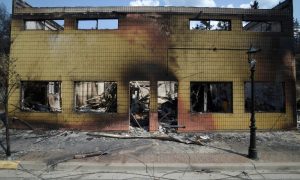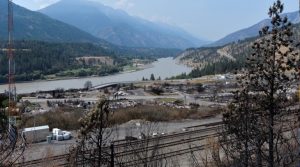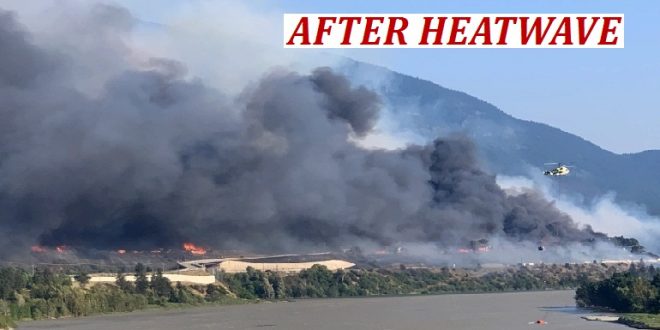12-07-2021
Canada has announced new measures aimed at preventing wildfires during periods of extreme heat, after a historic heatwave last month spurred dozens of large blazes on the country’s west coast including one that burned an entire village to the ground.
In a statement on Sunday, the federal transport department said railway operators would need to reduce the speed of trains when temperatures go beyond 30 Celsius, as well as ensure trains are not running with combustible materials that could spark a fire.
 Conductors will also be required to spot and report fires along their routes, among other measures that the federal government said took effect at midnight PST (07:00 GMT) on Sunday.
Conductors will also be required to spot and report fires along their routes, among other measures that the federal government said took effect at midnight PST (07:00 GMT) on Sunday.
“Unprecedented weather conditions in British Columbia continue to pose a serious threat to public safety and railway operations,” Minister of Transport Omar Alghabra said in the statement.
“The Government of Canada remains committed to supporting those affected by the devastating wildfires in British Columbia and will not hesitate to take any safety actions that are necessary to mitigate these risks to public safety and the integrity of railway tracks and infrastructure.”
The announcement comes after temperatures soared in Canada’s westernmost province late last month. Officials said the heatwave contributed to hundreds of deaths, particularly among more vulnerable elderly people.
The village of Lytton, in central BC, broke Canadian high-temperature records three times, hitting 49.6C (121.28F). A huge wildfire broke out shortly thereafter, forcing hundreds of residents to flee, destroying most of the community, and killing at least two residents.
“We are a small community that has been devastated and we are all still reeling from the destruction of our homes, the tragic loss of life and the enormous impact this will have on us, both personally and financially, for years to come,” the village said in a statement on July 6.
 It said several months of drought-like conditions as well as a blowing wind fuelled the fire, which tore through the community, burning homes, businesses and infrastructure, “with ferocious speed”.
It said several months of drought-like conditions as well as a blowing wind fuelled the fire, which tore through the community, burning homes, businesses and infrastructure, “with ferocious speed”.
“A few buildings survived in town but nearly every home in the centre of the village is gone. Where many buildings stood is now simply charred earth,” the statement said. “Infrastructure has been destroyed. What has not been melted, incinerated or damaged beyond repair has been compromised to the point of being unsafe.”
Experts have pointed to climate change as a factor that has worsened extreme weather events such as wildfires, heatwaves and tropical storms.
Brian Wiens, managing director at Canada Wildfire, a research consortium, said the recent heatwave on Canada’s west coast was linked to what has been called a “heat dome” – warm, dry air that covered a large area and made temperatures soar.
“What that does is it creates a situation on the ground where you basically have no precipitation, you have high temperatures, you have very low humidity and consequently all your fuels start to dry very, very quickly,” Wiens told Al Jazeera in an interview last week, before the government’s announcement on Sunday.
 That meant forest fuels – from grasses to large logs – became extremely flammable.
That meant forest fuels – from grasses to large logs – became extremely flammable.
“It also is occurring very early in the season. Very, very hot dry weather is not unusual for late July into August in BC in particular and Alberta, as well … but this is stronger and earlier than has been seen before,” Wiens said about last month’s weather system. “This is the kind of thing that you would talk about having 1,000 year return period.”
He said many of the wildfires in BC were sparked by lightning, though when the forest is extremely dry, “it doesn’t take much to get it lit.” He also said for temperatures to stay above the range deemed typical for an extended period of time was a “pretty strong indication that we’re seeing evidence of a shift in climate here”.
“This is exactly what we have been predicting … that if you have a shift in climate, you have more extremes and you have more risk. That’s certainly what we’re seeing in BC now.”
The western United States also experienced a heatwave last month, while wildfires have been burning in California and Nevada, among other states, during the weekend as temperatures again soared.
The National Weather Service (NWS) Weather Prediction Center said on Twitter on Friday morning that “record-breaking heat” was expected to affect “much of the West and Southwest”, with more than 31 million people under an excessive heat warning or heat advisory.
Experts have urged US President Joe Biden to take up an ambitious, long-term strategy to reduce the risk of devastating wildfires amid scorching heat and drought in several states. (Int’l News Desk)
 Pressmediaofindia
Pressmediaofindia




